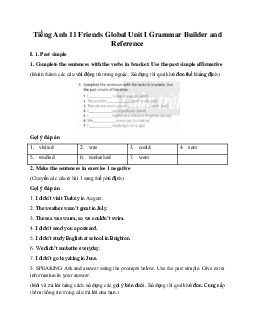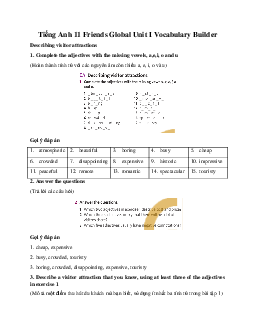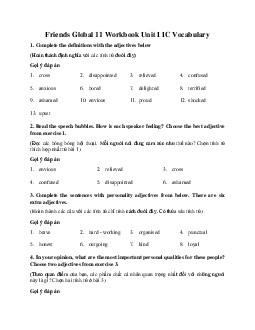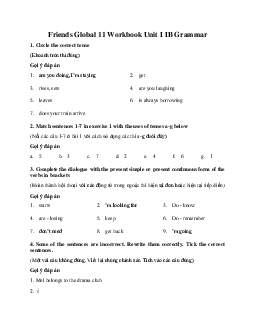




Preview text:
Tiếng Anh 11 Friends Global Unit Introduction IB Grammar
1. SPEAKING Work in pairs. Find out a) when and where your partner usually
does his/ her homework and b) what type of homework he / she likes most and least.
(Làm việc theo cặp. Tìm hiểu a) bạn của bạn thường làm bài tập về nhà khi nào và ở đâu
và b) anh ấy/cô ấy thích loại bài tập nào nhất và ít nhất.) Gợi ý đáp án
A: When do you usually do your homework?
B: I usually do my homework after my dinner, at about 7 to 9 p.m.
A: Where do you often do homework?
B: I often do homework in my room because I can have my private space to concentrate on my studying.
A: What type of homework do you like most?
B: I like Maths homework most because I like working with my calculator and the numbers.
A: And what type of homework do you like least?
B: I don't like Chemistry homework because it’s really hard to remember and understand all the chemical reactions.
2. Read and listen to the dialogue. Why is Sue annoyed with Dan at the end?
(Đọc và nghe đoạn đối thoại. Tại sao Sue lại khó chịu với Dan vào lúc cuối?) Gợi ý đáp án
Sue is annoyed with Dan at the end because he is always forgetting everything.
3. Why is present simple or present continuous used in each of the highlighted
examples from the dialogue?
(Tại sao hiện tại đơn hoặc hiện tại tiếp diễn được sử dụng trong mỗi ví dụ được đánh dấu từ hộp thoại?) Gợi ý đáp án
Because each tense has different functions and uses depending on different times and purposes.
4. Read the Learn this! box. Complete the rules (a-g) with the correct tenses: present
simple or present continuous.
(Đọc khung Learn this! Hoàn thành các quy tắc (a-g) với các thì đúng: hiện tại đơn hoặc hiện tại tiếp diễn.) Gợi ý đáp án a. present simple b. present c. present d. present simple continuous continuous e. present f. present g. present simple continuous continuous
Lời giải chi tiết We use: (Chúng ta sử dụng)
a. the present simple for habits and routines.
(thì hiện tại đơn cho thói quen.)
b. the present continuous for something happening now or about now.
(hiện tại tiếp diễn cho một cái gì đó xảy ra bây giờ hoặc về bây giờ.)
c. the present continuous for describing annoying behaviour (with always)
(thì hiện tại tiếp diễn để mô tả hành vi khó chịu (với “always”)
d. the present simple for a permanent situation or fact.
(thì hiện tại đơn cho một chân lý hoặc một sự thật.)
e. the present simple for timetables and schedules.
(thì hiện tại đơn cho thời gian biểu và lịch trình.)
f. the present continuous for future arrangements.
(thì hiện tại tiếp diễn cho các sắp xếp trong tương lai.)
g. the present simple in future time claues (starting with when, as soon as, after, if, etc.)
(thì hiện tại đơn trong các mệnh đề thời gian trong tương lai (bắt đầu với when, as soon as, after, if, v.v.))
5. Read the Learn this! Box. Find five stative verbs in the dialogue in exercise 2.
How do you know they are stative verbs?
(Đọc khung Learn this! Tìm 5 động từ tình thái trong đoạn hội thoại ở bài tập 2. Làm sao
bạn biết chúng là những động từ tình thái?) Gợi ý đáp án
Five stative verbs in the dialogue in exercise 2: like, need, know, remember, mind.
I know they are stative verbs because they describe states or situations and are not used in continuous tenses.
6. Complete the sentences with the present simple or present continuous form of the verbs in the brackets.
(Hoàn thành các câu với dạng hiện tại đơn hoặc hiện tại tiếp diễn của các động từ trong ngoặc.) Gợi ý đáp án 1. am meeting - do you want 2. walk - are going 3. don’t want - is raining
4. Are you enjoying - do you prefer
5. don’t believe - is always inventing
7. SPEAKING Work in pairs. Find out what your partner a) usually does at
weekends and b) is doing this weekend. Use the words below or your own activities.
(Làm việc theo cặp. Tìm xem đối tác của bạn a) thường làm gì vào cuối tuần và b) sẽ làm
gì vào cuối tuần này. Sử dụng các từ dưới đây hoặc các hoạt động của riêng bạn.) Gợi ý đáp án
A: What do you usually do on weekends?
B: I often stay at home to recharge my battery after a long week of studying. On Sunday,
I usually hang out with my friend at the coffee shop and go to the supermarket to buy some food for the next week.
A: How about this weekend? What are you doing?
B: On Saturday, I’m practicing playing badminton to prepare for the competition at my school. A: And on Sunday?
B: Well, this Sunday, I'm going to the cinema at Vincom center to watch “Nha Ba Nu”
movie with my family. It is a famous family movie. Would you like to come with us? A: Yes, I’d love to




